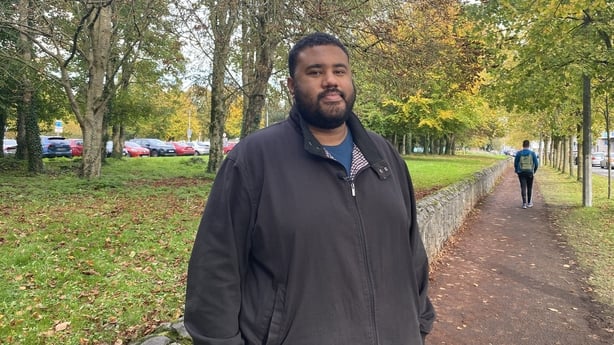A report today suggests that the level of racism directed at black people in Ireland has increased over the past five years, with the founder of one advocacy group saying the findings are deeply concerning but not surprising.
The research also found that people of African descent in the EU "face ever more racism and discrimination".
The 'Being Black in the EU' report was carried out by the EU Agency for Fundamental Rights. It examined the experiences of more than 6,700 people of African descent living in 13 different EU countries.
This is the second such report, the first report was carried out in 2016.
524 respondents in Ireland were surveyed. More than half of them (55%) said they experienced racial discrimination over the last five years. This was an increase from 48% in 2016 and is higher than the overall level across the 13 EU countries surveyed (45%).
The report found that 18% of people of African descent reported discrimination to an official body in the year before the survey. There was a decrease in the level of harassment since 2016.
Around 44% of respondents said they experienced racist harassment, compared to 51% five years ago. However, the level of harassment in Ireland is higher than the overall level in the countries surveyed (30%).
A total of 6% said they had experienced a racist attack, however 64% of people of African descent in Ireland said they worried about becoming a victim of a racist attack.
This is far higher than the average across the 13 countries surveyed (35%).

Chief Executive of the Black and Irish group, Leon Diop, said today's report is deeply concerning, but not surprising.
"Since starting Black and Irish, a number of people have been willing to come forward and share anecdotes of the racism they've experienced. Ultimately, it's a thing we need to recognise in Irish society, and say we need to work on this, we need to challenge it and eradicate it from our society".
Mr Diop said the group aims to highlight the Black Irish identity, and build a better quality of life for black and mixed race people in Ireland.
"I do feel that racial discrimination is growing and there are more instances where people are feeling emboldened to take part in racism or use racialised language", he said.
But Mr Diop said there were a number of organisations and groups working to build an anti-racist mindset and culture in Ireland.
"We need to build the culture of people being able to understand one another, being empathetic towards one another, and ultimately, I think that will win in the long run".
When it came to the experience of children in schools, 39% of parents surveyed said their children experienced offensive or threatening comments at school in the previous year, while 23% said their children were physically attacked.
The EU Agency for Fundamental Rights said these were the highest rates for bullying at school among the countries concerned.
The report also examined the issue of racial profiling.
A total of 39% of people said that they perceived their last police stop to be racial profiling.
It found that those who reported experiencing racial profiling showed a lower level of trust in the police than those who did not.
The level of racial discrimination experienced by black people in Ireland in relation to education, employment and housing is also higher than the average across the 13 countries surveyed.
It found that only 10% of people of African descent in Ireland own a property, compared to 70% of Irish people generally, and that 41% of people of African descent in Ireland live in overcrowded housing compared to 4% of Irish people generally.
Mr Diop said he had experienced some of the everyday challenges highlighted in the EU Fundamental Rights Agency report today.
"We saw a significant number of people experience racism trying to access housing. That is something I experienced when I was trying to come to university. I was told a house I was trying to rent wasn't suitable for people of African origin.
"This is something really upsetting and disturbing and I didn't know who to speak to about it. It tends to be an issue where people aren't sure where to go with it", he said.
He said that it was important that anyone who experiences racism can report it to the relevant authorities, whether that is the Irish Network Against Racism, or the gardaí.
Responses of more than 6,700 people across Europe analysed
The experiences of people of African descent in Ireland were reflected in the wider EU survey of 13 countries.
The responses of more than 6,700 people from Austria, Belgium, Denmark, Finland, France, Germany, Ireland, Italy, Luxembourg, Poland, Portugal, Spain and Sweden were analysed.
Overall, almost half of people of African descent in the EU face racism and discrimination in their daily life and this level has increased since 2016.
It found that racial harassment and ethnic profiling are common, especially for young people.
Director Michael O'Flaherty said it was shocking to see no improvement since the last survey in 2016.
"Instead, people of African descent face ever more discrimination just because of the colour of their skin," he said.
"Racism and discrimination should have no place in our societies. The EU and its member states should use these findings to better target their efforts and ensure people of African descent too can enjoy their rights freely without racism and discrimination."
The European Union Agency for Fundamental Rights is now calling on EU countries to take urgent steps to tackle racial discrimination and harassment.
It said that countries should: properly enforce anti-discrimination legislation; identify and record hate crimes; collect equality data; and ensure equality bodies have the necessary mandates and resources.
The agency also said that countries should take steps to prevent and eradicated discriminatory institutional practices and culture in policing and develop policies to address racism in education, employment, housing and healthcare.







